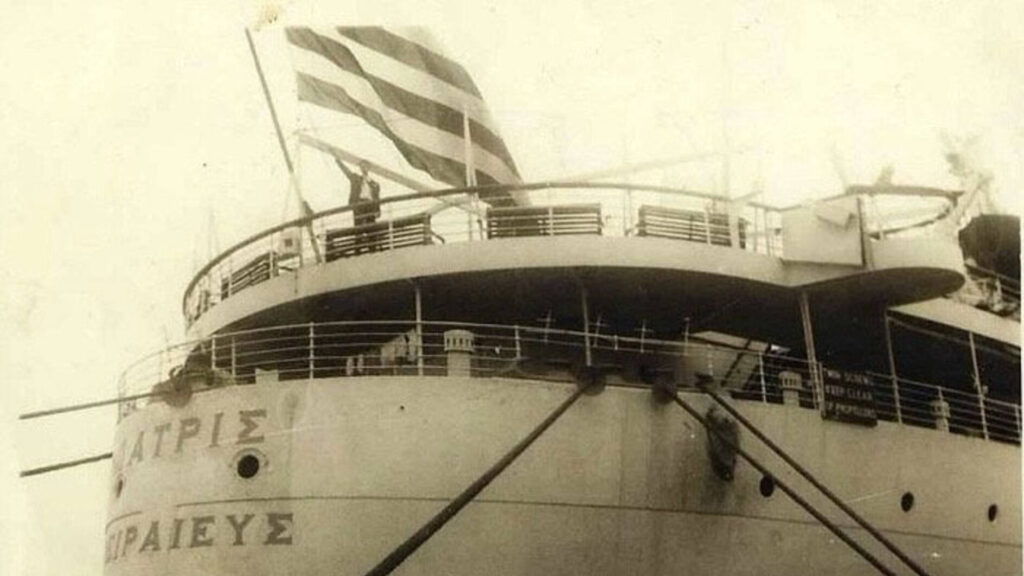The month of October 1961 remains unforgettable for Tasos Vasilopoulos, now 88 years old. Born in Messinia and orphaned at a young age, he was just 24 when he embarked on his journey to Australia.
“The moments I experienced in Piraeus are forever etched in my memory,” Tasos tells Neos Kosmos.
“Emotional, heartbreaking moments as relatives and friends said goodbye. I was alone. I left bitterly because one member of my family had leftist beliefs, making it impossible for me to find work.”

A young poet at sea
During his voyage to Australia aboard the Patris, Tasos channeled his emotions into poetry. One particular poem, written during the journey, captured his feelings of departure and longing. Over 60 years later, this poem was rediscovered by his grandson, Yiannis Tselepēs, and featured in the Melbourne-based youth group Poseidoniatai’s exhibition “Kalos Irthate” (Welcome).
This exhibition offered an opportunity to learn more about Tasos, who proudly shared that he has been a loyal reader of Neos Kosmos since setting foot in Melbourne.
“My first impressions of Melbourne weren’t great,” he recalls. “I found the wooden houses peculiar, and I couldn’t understand the public holiday for horse racing.”

Adjusting to a new life
Despite the initial challenges, Tasos gradually adapted to life in Australia. He frequented the “Dimokritos” club, where he met figures like Gogo and Mourikis, and was particularly struck by Alekos Doukas, who reassured him that Australia was a good country and offered advice on what pitfalls to avoid.
“Over time, I got used to it. I worked hard and prospered. I was blessed with a family, children, and grandchildren whom I am proud of today,” Tasos reflects.

A legacy preserved
One of the highlights of the Kalos Irthate exhibition was Tasos’ poem, written the day he departed Greece. The poem (translated from Greek below) conveys the sorrow of leaving one’s homeland and the hope of finding happiness in a distant land.
“I wrote this poem, overwhelmed by my emotions, upon leaving Greece on October 13, 1961,” says Taso who wanted to express the collective experience of Greek migrants who sought a better future abroad.

‘Mother, I leave with a bitter heart for foreign lands’
How many mothers wept bitterly in Piraeus,
as their children left for distant foreign lands.
The day of this farewell, October 13,
should be called the day of mourning.
The brave youth of Greece,
her daring children,
left their homeland
with heavy hearts.
Sweet mother Greece,
we bid you farewell now.
Your cherished children
depart for another land.
We go, sweet mother,
to faraway Australia,
in hopes of finding there
the happiness we seek.
Our Greece, our homeland,
our beloved mother,
why do you send your youth
so far away?
Have we not fought
such hard battles for you?
Your immortal name
will live on for centuries.
Your admired heroes,
leaving with sorrow,
shed their blood for you,
like water.
Our brothers fought
at Chani and Gravia,
and every nation wished
to have such children.
Did we not also proclaim
a defiant “No” in 1940,
raising high the torch
of liberty?
The symbol of freedom
that you hold so dear,
sweet Greece,
you owe to us.
And yet, sweet homeland,
though we will never forget you,
you send us away so cruelly,
making us suffer.
For our sacrifices,
so bloody and severe,
you treat us like a stepmother,
sending us to far-off lands.
Sweet mother, Greece,
gather your children
from foreign lands.









